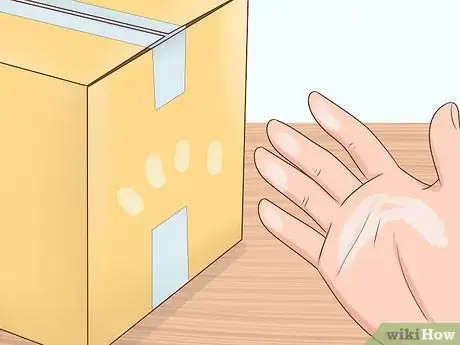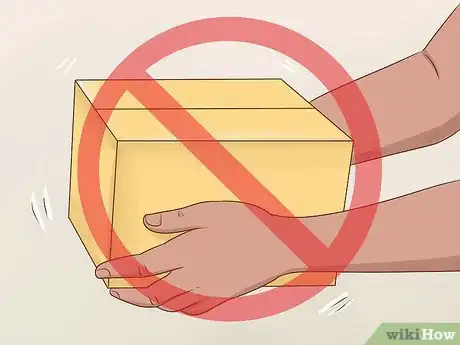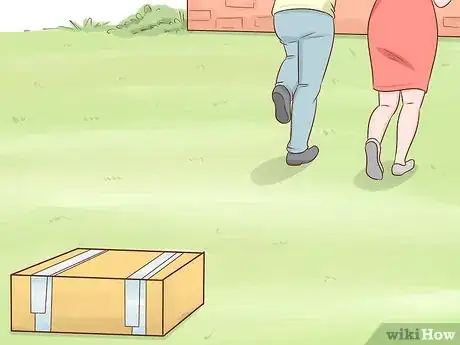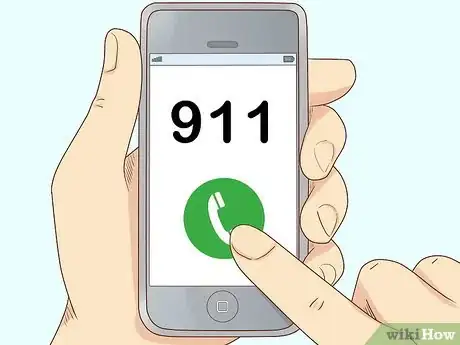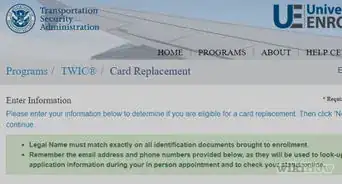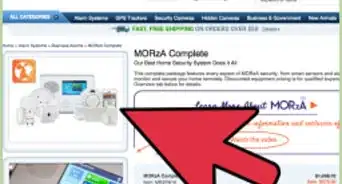This article was co-authored by wikiHow Staff. Our trained team of editors and researchers validate articles for accuracy and comprehensiveness. wikiHow's Content Management Team carefully monitors the work from our editorial staff to ensure that each article is backed by trusted research and meets our high quality standards.
This article has been viewed 47,109 times.
Learn more...
According to the U.S. Postal Inspection Service, the chances of receiving a package that contains a bomb are less than 1 in 10 billion.[1] However, packages containing suspicious and possibly dangerous contents are sometimes processed and delivered, so it’s important to know what to look for if you have concerns about a package you receive. Fortunately, there are usually clear signs that a package has suspicious contents. By learning how to recognize these signs and what to do if you think a package is dangerous, you can keep yourself safe when dealing with a suspicious parcel.
Steps
Examining the Package
-
1Check for words that are poorly written or misspelled. Look to see if your address is handwritten or poorly typed and if it contains any misspellings of common words, such as your street name or your city.
You should also note if your name is misspelled or not specified on the package, which could be a sign that the sender is suspicious.[2]
-
2Watch out for an unknown or missing return address. If you don’t recognize the return address, or if there is no return address at all, it may be a sign that the package is suspicious. Also be cautious if the return address contains misspelled words or nonsensical information.[3]Advertisement
-
3Note any markings on the package, like “Confidential” or “Personal.” A suspicious package may also say something like “Do not x-ray.” Markings like this on the package could indicate that it was sent by someone suspicious.[4]
- You should also note if there is any threatening language on the package, such as “Beware of contents.”
-
4Be wary of packages with excessive postage or tape. Excessive postage on the package or unnecessary amounts of packaging tape may indicate that the sender wanted to make it difficult for you to determine what is in the package.[5]
-
5Examine the package to see if it’s lumpy, bulky, or lopsided. A package with an odd, uneven shape could indicate that the contents of the package are suspicious. Watch out for bulges, soft spots, or an overall uneven appearance.[6]
-
6Look for powdery substances or oily stains on the outside of the package. Examine the outside of the package for any powdery substances on the envelope or wrapping. Lightly hold the package and feel through the wrapping or the envelope for any powdery substances. You may also notice oily stains or discoloration on the outside of the package.[7]
- Note if the package has a strange or strong odor, as this may indicate there is a suspicious substance in the package. Try to smell the package quickly and only once, as you do not want to inhale or come in contact with any substances in the package.
-
7Look for protruding wires. If there are any protruding wires or aluminum foil coming out of the package, it may be a sign that it contains a suspicious device.[8]
-
8Check for ticking sounds or vibrations. Hold the package in your hands and see if you can hear any ticking noises or feel any vibrations. Ticking sounds and vibrations may also indicate that there’s a suspicious device in the package.[9]
Handling the Suspicious Package
-
1Do not shake or open the package. If you believe the package may be suspicious, it is important that you do not shake, open, or empty the contents of the package. You should also avoid carrying the package or showing it to others to examine.[10]
- If you determine it is suspicious, do not sniff, touch, taste, or look at any of the contents.
-
2Alert others in the area and leave the package on a stable surface. Let anyone else known in the residence, home, or area, that you believe you have received a suspicious package. Place the package on a stable surface and leave the area. Make sure anyone else in the area also evacuates and do not allow anyone to enter the area with the suspicious package.[11]
- If you have a ventilation system, like an air conditioner system or a heating system, turn it off so the contents of the package cannot circulate in the area.
-
3Wash your hands. Give your hands a good wash with soap and water to prevent spreading any potentially dangerous substances to your face or skin. Once law enforcement officials arrive, they will be able to give you additional instructions on dealing with exposure to potentially dangerous substances.[12]
-
4Call your local law enforcement agency. If you are at work, contact your supervisor or a security officer. Let them know you believe you have received a suspicious package and that they need to call local law enforcement.[13]
- If you are at home, use your cellphone or a neighbor’s phone to call your local law enforcement and report the suspicious package.
- Try to make a list of the people who were in the room or area where the suspicious package was recognized and anyone who many have handled the suspicious package. You should provide this list to local law enforcement when they arrive on the scene.
Community Q&A
-
QuestionWill the US Postal Service help to keep junk mail from being mailed to me?
 DonaganTop AnswererNo. The Postal Service will attempt to deliver any legal mail consigned to it. Your only recourse is to demand the mailer stop mailing to you.
DonaganTop AnswererNo. The Postal Service will attempt to deliver any legal mail consigned to it. Your only recourse is to demand the mailer stop mailing to you. -
QuestionDo I leave the area when I receive a suspicious package?
 Community AnswerNot necessarily, but if you are 100% sure it is something that could harm you or kill you, get a good distance away from the package and call the police and let them handle the situation. If you are in the house when noticing the package, do not go through the entrance where the package was placed. Instead try going through another exit or the window if you have to.
Community AnswerNot necessarily, but if you are 100% sure it is something that could harm you or kill you, get a good distance away from the package and call the police and let them handle the situation. If you are in the house when noticing the package, do not go through the entrance where the package was placed. Instead try going through another exit or the window if you have to.
References
- ↑ https://postalinspectors.uspis.gov/radDocs/bombs.htm
- ↑ https://www.cnn.com/2018/10/24/us/suspicious-package-mail-bomb-detect-trnd/index.html
- ↑ https://www.cnn.com/2018/10/24/us/suspicious-package-mail-bomb-detect-trnd/index.html
- ↑ http://www.osec.doc.gov/osy/PDF/SafeMailing.pdf
- ↑ https://www.cnn.com/2018/10/24/us/suspicious-package-mail-bomb-detect-trnd/index.html
- ↑ https://www.cnn.com/2018/10/24/us/suspicious-package-mail-bomb-detect-trnd/index.html
- ↑ http://www.osec.doc.gov/osy/PDF/SafeMailing.pdf
- ↑ http://www.osec.doc.gov/osy/PDF/SafeMailing.pdf
- ↑ https://www.cnn.com/2018/10/24/us/suspicious-package-mail-bomb-detect-trnd/index.html





